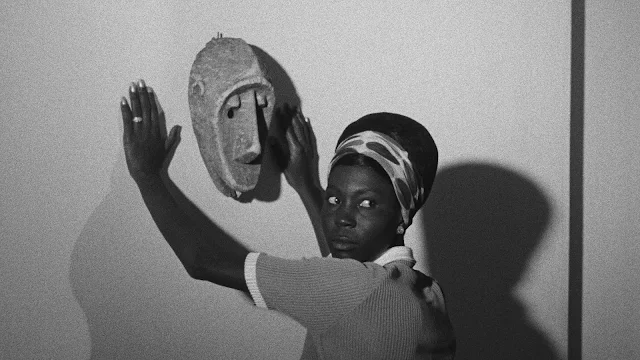 |
| Mbissine Thérèse Diop in Black Girl |
Madame: Anne-Marie Jelinek
Monsieur: Robert Fontaine
Diouana's Boyfriend: Momar Nar Sene
Boy With Mask: Ibrahima Boy
Director: Ousmane Sembene
Screenplay: Ousmane Sembene
Based on a story by Ousmane Sembene
Cinematography: Christian Lacoste
With a run time of just about an hour, Black Girl is a marvel of condensed storytelling, even though it uses a sophisticated technique like flashbacks to create its powerful portrait of the wounds of colonialism. It begins in medias res, with Diouana's arrival in France to serve as the maid -- although she expects to work as a nanny, as she had in Dakar -- to a French couple. We learn a bit of her life in Senegal at the same time that we see her disillusionment and eventual slump into depression with what she becomes in the small apartment in Antibes of the couple. The children are away -- presumably at boarding school or with relatives -- and Diouana is forced into a round of cooking and cleaning that she had never expected. She sees nothing of the city outside of the apartment, and is subjected to insults from the couple's guests: An older man, for example, insists on grabbing her and kissing her because, he says, "I've never kissed a negress." The Frenchwoman's friends chatter about Diouana as if she is invisible, asking if she understands French. Told that she does, one of them says she must do so "instinctually" and adds, "like an animal." The result of the exploitation and abuse is tragic, and although what happens might seem melodramatic to some, I think it feels consistent with the way Sembene tells the story, almost as a moral fable. The central symbol of the fable is a mask that Diouana gave to her employers when she first went to work for them in Dakar. She finds it hanging on a wall of the stark modern apartment in Antibes, a touch of decor without significance, and when she decides she's had enough with her life there, she takes it down and puts it with her luggage. She never goes back to Dakar, however, but the man for whom she worked does, and he returns the mask with her belongings to Diouana's mother. A small boy, whom we first saw playing with the mask before Diouana gave it away, finds it and follows the Frenchman, who takes fright and runs away from him -- the European colonizer fleeing the new Africa.